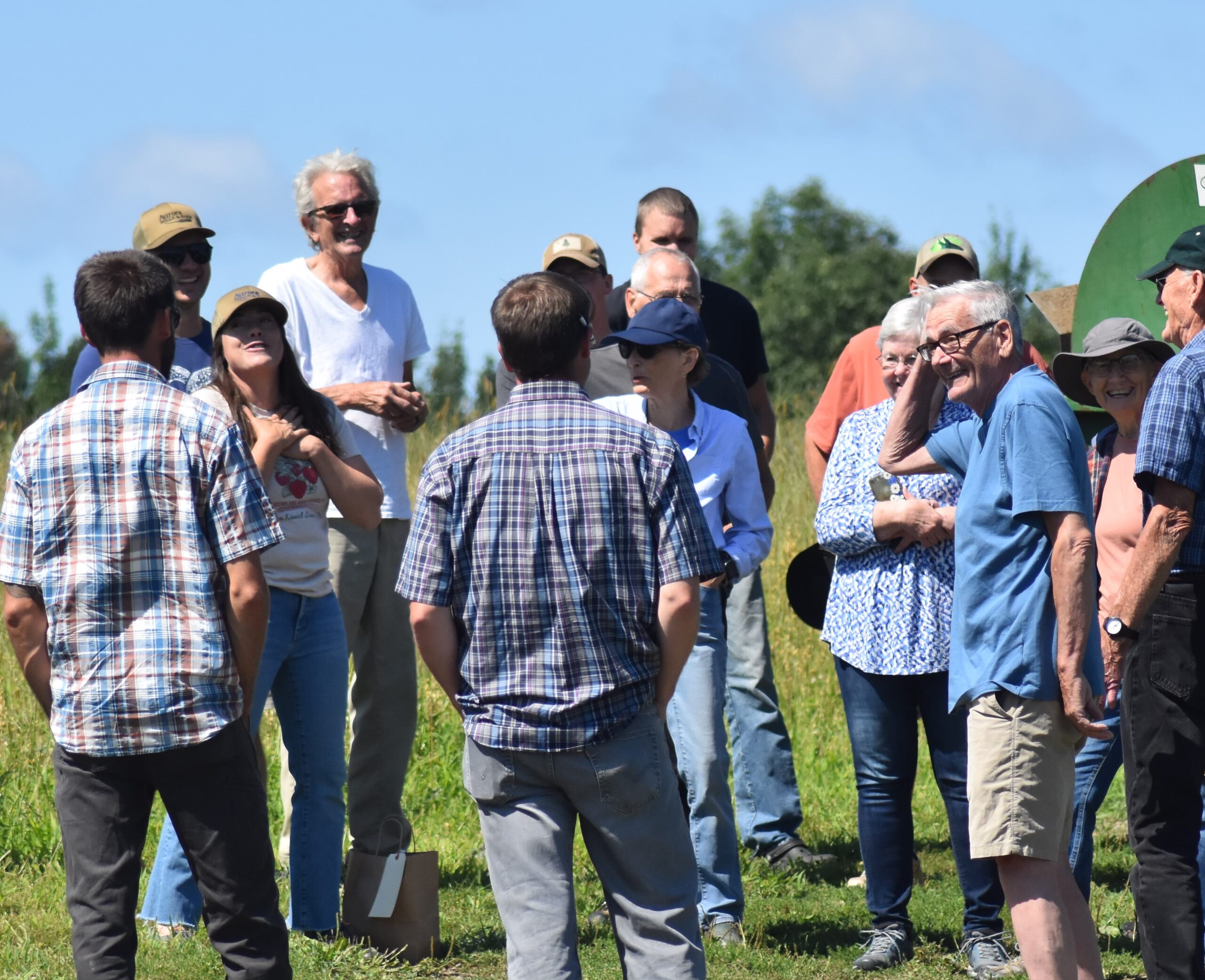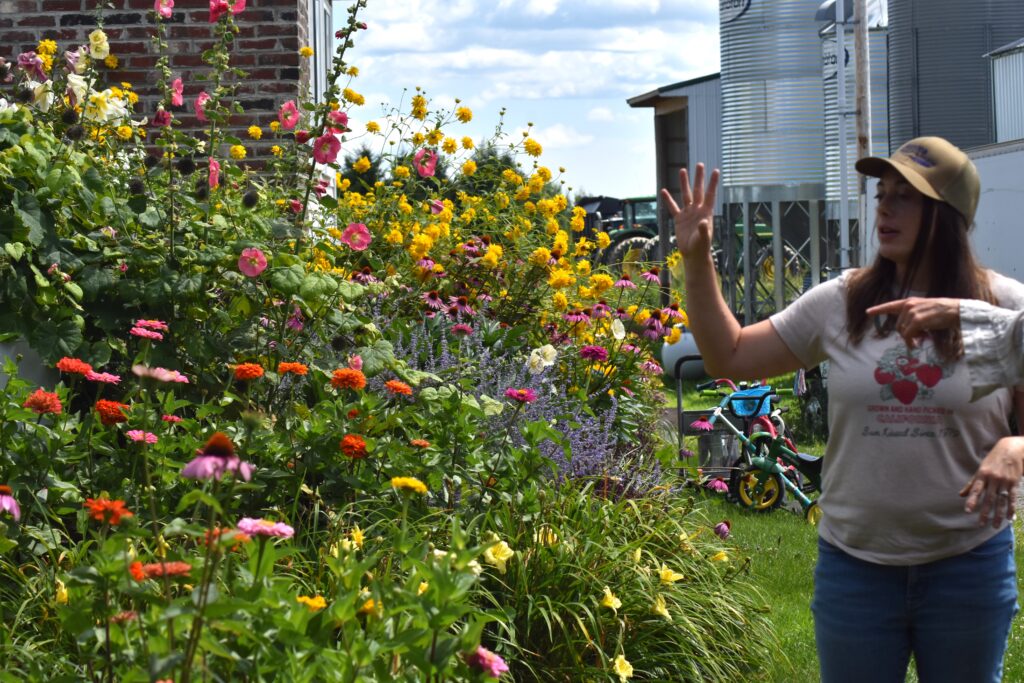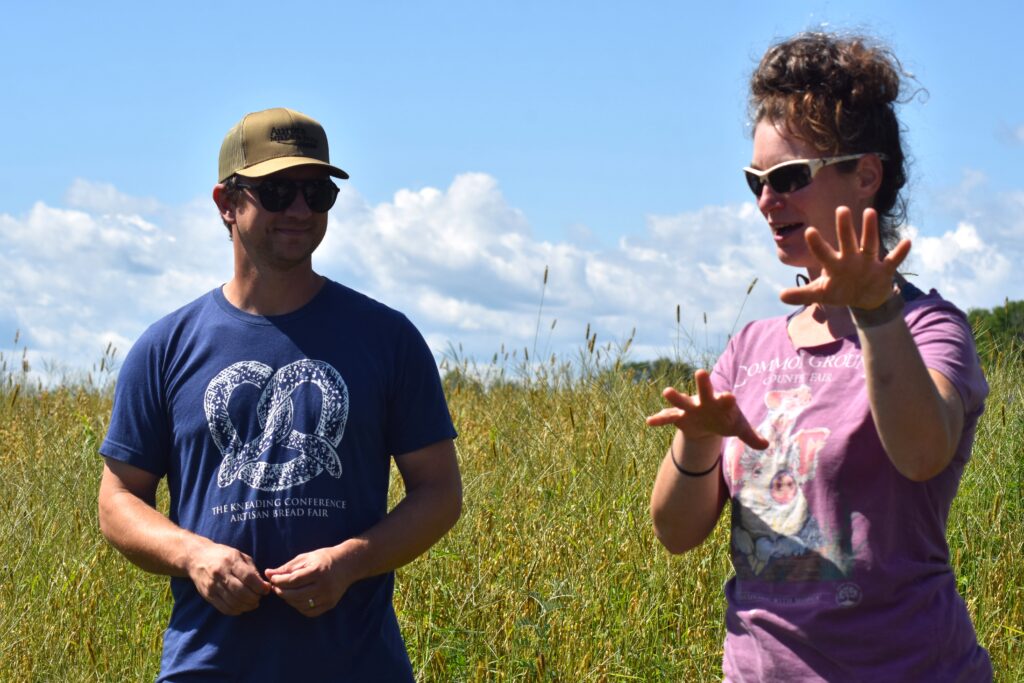
LINNEUS, Maine — As new markets for locally grown grains emerge, Maine farmers are learning from the state’s pioneers in the field how to transition from growing grains as potato rotation crops to producing them for breads, craft beers, tofu, tempeh and even field pea fritters.
“For many farmers, grains were seen as a bridge to getting back to potatoes,” said Tristan Noyes, executive director for the Maine Grain Alliance. “But grains in general are a very important part of our regional food system and economy.”
The Maine Grain Alliance along with the Maine Organic Farmers and Gardeners have been helping area farmers make the transition through educational farm field days, mentoring programs that match farmers with grain growers and educational workshops.
About 25 interested growers attended a farm field day at Aurora Mills and Farm in Linneus on Wednesday, as part of a Maine Grain Alliance’s Transition to Organic Partnership Program grant.
This free event, designed for farmers, featured a tour of the farm along with suggestions and guidance from owners Sara and Marcus Flewelling, who have decades of grain growing experience.
Aurora Mills and Farm is 100 percent organic. The Flewellings farm 450 acres of grains including oats, field peas, soybeans, winter rye, hard red spring wheat and Japanese buckwheat.

“Aurora Mills and Farm is an incredible example of how organic grains can make a huge difference for farmers and the regional grain economy,” Noyes said.
The Linneus growers process stone ground flours, rolled oats and cover crop seeds that they sell to Fedco Seeds.
Their grains are distributed to many breweries through Blue Ox Malt House, and they have direct relationships with breweries like Allagash Brewing. Their rolled oats are used in colleges, including the University of New Hampshire, Dartmouth, Boston College and Tufts. Their stone ground flours go to Borealis Breads and Tinder Hearth Bakery and are also available for retail sale through Wood Prairie Family Farm in Bridgewater.
Their Japanese buckwheat is used in soba noodles in a Japanese restaurant and their soybeans go to Heiwa Tofu. Aurora Mills field peas make up a field pea fritter being used in hospitals as part of a health care project getting plant-based proteins into patient meals, said Sara Flewelling.
Sara’s father, Matt Williams, is a retired state cooperative extension educator who started Aurora Mills and Farm in 1996. Sara, who worked for several years in Washington, D.C. as a landscape designer, came back to Maine in 2013. That’s when she met Marcus. The couple took over the farm in 2020.
The regional grain economy has exploded, according to Noyes.
“We are on shelves all the way to New York City, in food stores and bigger bakeries,” he said.
Allagash Brewers in Portland made a commitment several years ago to increase the use of locally grown grains, Sara Flewelling said, adding that they often host Allagash events at the farm.
“Five years ago [Allagash] used about 60,000 pounds of local grains,” Noyes said. Shifting from a midwest source and with research and rewriting recipes, in 2023 they used 1.8 million pounds of local grains, he said.
“We are in multiple Allagash national releases and Alagash White,” Sara Flewelling said.
A hundred years ago grains were farmed and milled locally and stone ground grains were available in local markets. But the mills eventually closed and local options disappeared, Noyes said, adding that as tastes have moved away from white flours and back to whole grains, there is an opportunity for Maine farmers.

That’s where the field days and other educational programs come in.
“When farmers come they can start to get ideas of how best to grow the grains for beers and breads,” he said. “And they might see ways they could collaborate with other farms.”
On Wednesday, they showed the farmers the original mill and the new building space. Marcus Flewelling talked about their new 12-ton tank that can process 5-7 tons an hour and gives them 99 percent pure ingredients.
They talked about Northern Maine’s weather and how overnight drops in temperature lead to a sweeter grain that people really like. They also talked about last year and how the rain hurt so many farms.
“Across the whole state there were 50 percent yields last year,” Noyes said to the participants. “Which speaks to the incredible infrastructure Aurora has put up. You are able to have a good year and keep it for a longer market window when you have a bad year.”
Noyes said they are planning another Farm Field Day in the fall at the Rusted Rooster in Piscataquis County.
“We are looking to do three a year,” he said.
Additionally, the Maine Grain Alliance is creating a heritage grain website from seed savers from around the country that will be released in early fall.
“We are helping teach people and we have a big push on education,” he said. “This field day was part of a bigger educational push to help farmers understand organic grain growing methods and understand markets and the sale of their grains. All this is to create the opportunity for local grains to enter into the bigger market like Aurora Mills.”







